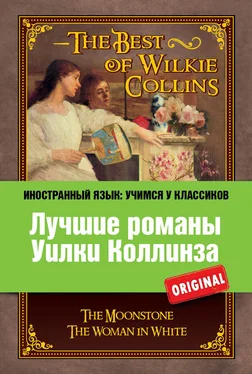The second question, concerning the nature of the legal contract by which the money was to be obtained, and the degree of personal responsibility to which Laura might subject herself if she signed it in the dark, involved considerations which lay far beyond any knowledge and experience that either of us possessed. My own convictions led me to believe that the hidden contents of the parchment concealed a transaction of the meanest and the most fraudulent kind.
I had not formed this conclusion in consequence of Sir Percival’s refusal to show the writing or to explain it, for that refusal might well have proceeded from his obstinate disposition and his domineering temper alone. My sole motive for distrusting his honesty sprang from the change which I had observed in his language and his manners at Blackwater Park, a change which convinced me that he had been acting a part throughout the whole period of his probation at Limmeridge House. His elaborate delicacy, his ceremonious politeness which harmonised so agreeably with Mr. Gilmore’s old-fashioned notions, his modesty with Laura, his candour with me, his moderation with Mr. Fairlie – all these were the artifices of a mean, cunning, and brutal man, who had dropped his disguise when his practised duplicity had gained its end, and had openly shown himself in the library on that very day. I say nothing of the grief which this discovery caused me on Laura’s account, for it is not to be expressed by any words of mine. I only refer to it at all, because it decided me to oppose her signing the parchment, whatever the consequences might be, unless she was first made acquainted with the contents.
Under these circumstances, the one chance for us when to-morrow came was to be provided with an objection to giving the signature, which might rest on sufficiently firm commercial or legal grounds to shake Sir Percival’s resolution, and to make him suspect that we two women understood the laws and obligations of business as well as himself.
After some pondering, I determined to write to the only honest man within reach whom we could trust to help us discreetly in our forlorn situation. That man was Mr. Gilmore’s partner, Mr. Kyrle, who conducted the business now that our old friend had been obliged to withdraw from it, and to leave London on account of his health. I explained to Laura that I had Mr. Gilmore’s own authority for placing implicit confidence in his partner’s integrity, discretion, and accurate knowledge of all her affairs, and with her full approval I sat down at once to write the letter, I began by stating our position to Mr. Kyrle exactly as it was, and then asked for his advice in return, expressed in plain, downright terms which he could comprehend without any danger of misinterpretations and mistakes. My letter was as short as I could possibly make it, and was, I hope, unencumbered by needless apologies and needless details.
Just as I was about to put the address on the envelope an obstacle was discovered by Laura, which in the effort and preoccupation of writing had escaped my mind altogether.
“How are we to get the answer in time?” she asked. “Your letter will not be delivered in London before to-morrow morning, and the post will not bring the reply here till the morning after.”
The only way of overcoming this difficulty was to have the answer brought to us from the lawyer’s office by a special messenger. I wrote a postscript to that effect, begging that the messenger might be despatched with the reply by the eleven o’clock morning train, which would bring him to our station at twenty minutes past one, and so enable him to reach Blackwater Park by two o’clock at the latest. He was to be directed to ask for me, to answer no questions addressed to him by any one else, and to deliver his letter into no hands but mine.
“In case Sir Percival should come back to-morrow before two o’clock,” I said to Laura, “the wisest plan for you to adopt is to be out in the grounds all the morning with your book or your work, and not to appear at the house till the messenger has had time to arrive with the letter. I will wait here for him all the morning, to guard against any misadventures or mistakes. By following this arrangement I hope and believe we shall avoid being taken by surprise. Let us go down to the drawing-room now. We may excite suspicion if we remain shut up together too long.”
“Suspicion?” she repeated. “Whose suspicion can we excite, now that Sir Percival has left the house? Do you mean Count Fosco?”
“Perhaps I do, Laura.”
“You are beginning to dislike him as much as I do, Marian.”
“No, not to dislike him. Dislike is always more or less associated with contempt – I can see nothing in the Count to despise.”
“You are not afraid of him, are you?”
“Perhaps I am – a little.”
“Afraid of him, after his interference in our favour to-day!”
“Yes. I am more afraid of his interference than I am of Sir Percival’s violence. Remember what I said to you in the library. Whatever you do, Laura, don’t make an enemy of the Count!”
We went downstairs. Laura entered the drawing-room, while I proceeded across the hall, with my letter in my hand, to put it into the post-bag, which hung against the wall opposite to me.
The house door was open, and as I crossed past it, I saw Count Fosco and his wife standing talking together on the steps outside, with their faces turned towards me.
The Countess came into the hall rather hastily, and asked if I had leisure enough for five minutes’ private conversation. Feeling a little surprised by such an appeal from such a person, I put my letter into the bag, and replied that I was quite at her disposal. She took my arm with unaccustomed friendliness and familiarity, and instead of leading me into an empty room, drew me out with her to the belt of turf which surrounded the large fish-pond.
As we passed the Count on the steps he bowed and smiled, and then went at once into the house, pushing the hall door to after him, but not actually closing it.
The Countess walked me gently round the fish-pond. I expected to be made the depositary of some extraordinary confidence, and I was astonished to find that Madame Fosco’s communication for my private ear was nothing more than a polite assurance of her sympathy for me, after what had happened in the library. Her husband had told her of all that had passed, and of the insolent manner in which Sir Percival had spoken to me. This information had so shocked and distressed her, on my account and on Laura’s, that she had made up her mind, if anything of the sort happened again, to mark her sense of Sir Percival’s outrageous conduct by leaving the house. The Count had approved of her idea, and she now hoped that I approved of it too.
I thought this a very strange proceeding on the part of such a remarkably reserved woman as Madame Fosco, especially after the interchange of sharp speeches which had passed between us during the conversation in the boat-house on that very morning. However, it was my plain duty to meet a polite and friendly advance on the part of one of my elders with a polite and friendly reply. I answered the Countess accordingly in her own tone, and then, thinking we had said all that was necessary on either side, made an attempt to get back to the house.
But Madame Fosco seemed resolved not to part with me, and to my unspeakable amazement, resolved also to talk. Hitherto the most silent of women, she now persecuted me with fluent conventionalities on the subject of married life, on the subject of Sir Percival and Laura, on the subject of her own happiness, on the subject of the late Mr. Fairlie’s conduct to her in the matter of her legacy, and on half a dozen other subjects besides, until she had detained me walking round and round the fish-pond for more than half an hour, and had quite wearied me out. Whether she discovered this or not, I cannot say, but she stopped as abruptly as she had begun – looked towards the house door, resumed her icy manner in a moment, and dropped my arm of her own accord before I could think of an excuse for accomplishing my own release from her.
Читать дальше
Конец ознакомительного отрывка
Купить книгу












